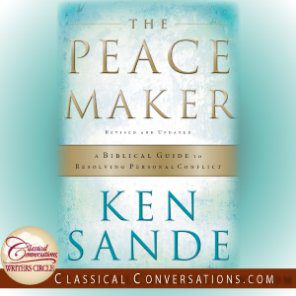The Peacemaker Monthly
Part One – Glorify God
Breathe Grace
by Cara McLauchlan
“Peacemakers are people who breathe grace.”
– The Peacemaker, page 11
I want to breathe grace. I love the idea of it and think I do breathe grace, sometimes, but oftentimes, not really. Quite often I breathe criticism, fears, worries, judgment, and passive aggressiveness. How could such a beautiful act be so hard to do?
There is something fresh about being around people who breathe grace. My friend Mary Margaret was such a person. I met her when she was in her eighties and I was in my twenties as we were helping to launch a brand new church. Every week, I worried about how many people would show up, whether the marketing plan was working, whether there were enough greeters, whether the message and the music were inspiring? I fretted constantly.
When I would speak with Mary Margaret about how church was going, she would notice the beauty of it. She would soak in the moment, awash in the richness of the word and God’s presence; she never once thought about the details. She would share her early memories of a church beginning when she was a newlywed.
“There was something so lovely about the early days of the church,” she reminisced. “Families would gather and just be together, sharing the word, being in fellowship, and loving the Lord. We were such a small little band, but it was so cozy and filled with the Spirit.”
Her vision of how much wonder could be found in the smallness and the sweetness of something changed everything for me. I was thinking it had to be big, important, perfect, and fancy to be good. Her vision of grace, beauty, and love for the church inspired me to change my mind. She breathed grace.
When I first opened The Peacemaker by Ken Sande, the preface reads like a healing balm:
“Peacemakers are people who breathe grace. They draw continually on the goodness and power of Jesus Christ, and then they bring his love, mercy, forgiveness, strength and wisdom to the conflicts of daily life. God delights to breathe his grace through peacemakers and use them to dissipate anger, improve understanding, promote justice, and encourage repentance and reconciliation” (page 11).
When I read this passage, I am soothed by the wonder of it. Hidden in its words is a boldness, too. As for me, I am a harmony addict—the one who smoothes things over, quickly admits it was my fault, and then puts a smile on a tense situation. Sande calls these the “escape” responses, when I am more interested in avoiding conflict than resolving it. Unfortunately, I am what he calls the “peace-faker.”
Opposite the “peace-faker” is the “attack” response, using aggressive styles to overpower the opponent. I have had several bosses like that. They are the ones who talk louder to ensure they are heard and they demand nothing less than everything from you.
Truly, the best response is what Sande calls the “peacemaking response” which he explores throughout his book, incorporating the best of biblical reconciliation.
During the school year ahead, we will be exploring this book and the key peacemaking principles which Sande calls the “Four Gs”: Glorify God, Get the Log Out of Your Eye, Gently Restore, and Go and Be Reconciled. Will you read along with me as we discover and experience these ideas together? Each month, we will discuss a section of the book and see how we can apply these important principles to our lives.
The Peacemaker is like spiritual dynamite for me. I love the idea of being a peacemaker and breathing grace, but I know this means change. It might mean facing conflict, loving anyway, forgiving hard things, raising standards to the biblical level, and choosing God’s ways, not our own. I think peacemaking is hard because it requires us to tap into the mystery of our faith. It requires us to let go of the human parts of conflict and to choose higher things, better things in Him.
My hope is to be a grace maker like Mary Margaret, who is now in heaven. Memories of her light inspire me to find a way.
Read Along in The Peacemaker
Read the Preface (Don’t miss this!) (pages 11-16)
Read Part 1/Section One (Pages 17-42)
Good Questions:
- How do you handle conflict?
- Where do you struggle most with conflict?
- Can you think of a time when you handled conflict well? What did you do that made it go smoothly?
- Can you think of a time when you didn’t handle conflict well? What went wrong?
- How do you feel about change?
- How can you create a fresh mindset about change as a good thing?
- Who do you know that is a true peacemaker? What qualities or characteristics make them a peacemaker?




